On 25 December, UWI organized a webinar entitled “Regional Cooperation to Stop Israeli Aggression”. The webinar addressed the reasons and consequences of the al-Aqsa Storm operation on 7 October, the current situation in Gaza, and the positions of the countries in the region. In addition to the assessment of the current situation, the webinar presented and discussed proposals on how to stop the US-backed Israeli aggression, and the steps that different countries, organizations and people can take in this regard.
The speakers of the webinar were Dr Basem Naim, Chairman of the international Bureau of Hamas, Dr. Ahmad Malli, Member of the Politburo of Hezbollah, Prof. Bassam Abu Abdullah, political scientist from Syria and Vyacheslav Matuzov, former Soviet and Russian Diplomat.
UWI author Yunus Soner moderated the webinar and held an introductory speech. Soner outlined two different approaches regarding the Palestine conflict. He said the first approach acknowledged the US’ dominance over Israel and laid emphasis on the endeavor to convince the United States to stop Israeli aggression. This approach, currently the predominant one, was being pursued via diplomatic initiatives vis-à-vis Washington and other Western capitals, proposals to international organizations such as the UN and a general media campaign calling Western countries, organizations, and public opinion to act.
Soner stated that the aim of the webinar was a different approach, in so far as it laid the emphasis on what the countries of the region themselves, and more importantly together vis-à-vis Israel can do. The UWI author invited the participants to elaborate on what their respective countries can practically do to stop the Palestine struggle and at the same time weaken the Israeli side. Underlying this approach is the assumption that the regional balance of force between Israel and its allies versus Palestine and its allies is ultimately the main factor not only for the future of a Palestinian state but also to change the position of Washington.
We present the presentations of the speakers and their answers to the questions. The complete webinar can be watched here.
The first speaker of the webinar was Dr. Basem Naim, Chairman of the international Bureau of Hamas.
Not only about Gaza
I agree with the thing you wrote in your invitation letter for the webinar: It is not only about Gaza, the West Bank and Palestine but about the whole region. October 7th undermined a lot of plans of the US. After the US’s partial withdrawal from the region, it assigned its role to Israel. Israel has been doing that with the cooperation of some Arabic countries through the so-called Abraham Accords, some even have started to talk about an Arabic NATO.
“Normalization” with Israel
Netanyahu was able to convince many that he could buy us the Palestinian people and go for normalization with the Arabic countries without solving the conflict with the Palestinians. October 7th sent a strong message that no one can buy us the Palestinians, and no one can solve any problem, and enjoy security and stability in the region without solving the Palestinian question.
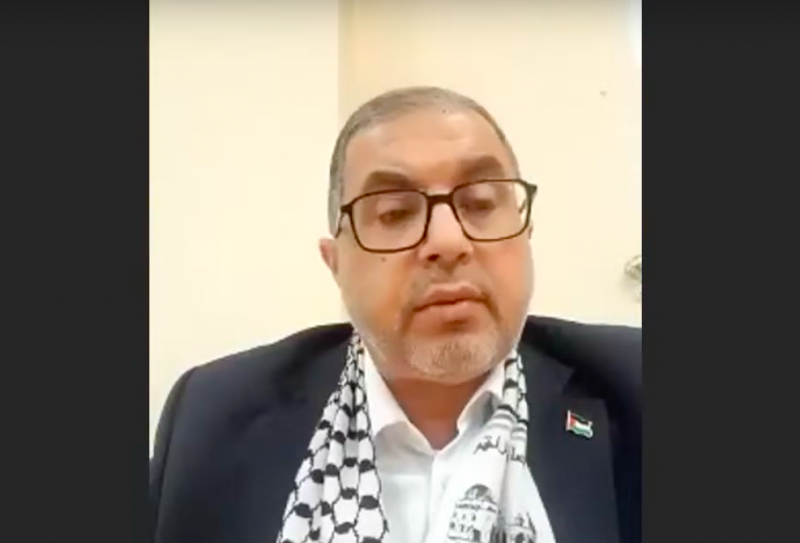
The impact of October 7th
The second issue is that October 7th has hit Israel in the core, first as its being a regional power which has been seen by many countries in the region as a protector. October 7th showed that Israel is not even able to protect itself. October 7th has also sent a strong message to the Jews around the world who have been hearing the Israeli propaganda that Israel is the most secure place for them. I think a lot of Jews are not rethinking about coming back to Israel.
October 7th has broken the power of 75 years of manipulated narrative on the conflict. For the first time, people in the world could see the reality. This time we could bypass the control of the mainstream media. Thus we believe that October 7th is a historical moment for us.
Some people ask the reason for the October 7th. It is a response to 75 years of oppression. Resistance by all available means, including armed, is an internationally guaranteed lawful right for all people under occupation.
Operation al-Aqsa Storm: Why now?
And a lot of people ask, “Why now”. Many people around the world don’t know that Israel has adopted a plan in 2018. The plan includes, firstly total Jewization of Jerusalem and expelling all Palestinians from the eastern part of the city, secondly annexation of the West Bank totally or mostly, thirdly total takeover of al-Aqsa Mosque and converting it into a temple, fourthly the issue of Palestinian prisoners, and lastly siege of Gaza. Before October 7th, we brought up all these titles in the talk we had with politicians, diplomats and journalists. We told them this was an attempt to finalize the conflict totally based on the denial of the rights of the Palestinians and would lead sooner or later to a big explosion that would extend beyond the borders of Palestine.
I agree with what Professor Bessam Abu Abdullah said: On October 7th Palestinians defeated Israel. The whole narrative on the power of the army and intelligence service of Israel has been hit in depth.
Expelling the Palestinians to Sinai
Afterwards October 7th is another victory for us. We see the steadfastness of the people who refuse to leave their own land and resist with their blood and body, by sacrificing themselves and their children. The first target of these brutal attacks of Israel was to push the Palestinians to Sinai, but they failed. A few hours ago we got new information from Gaza that the Israeli army is losing officers and soldiers from the elite brigades.
Humanitarian disaster
On the other side, we have a humanitarian disaster in Gaza. Israel is now suffocating Gaza for more than 50 days. No water, no food, no electricity, no medicine. This is maybe the first humanitarian disaster registered in front of the eyes of the whole world. People are starving and dying from lack of medicine and water. Therefore we have to move urgently and stop this aggression immediately. We need to open the borders for humanitarian aid. Why did humanity, Arabs and Muslims fail to ensure the access of the people of Gaza even to water and food, while all the colonial powers supported Israel by ships, jets and all kinds of weapons?
International law?
International humanitarian law has been smashed under the tanks of the Israeli army. In such a world who can talk about respecting international law? No one can oblige the Americans to stop its veto blocking the international will at least for a ceasefire. I think what is happening in Gaza will have important repercussions also at the international level.
We are waiting for help and support from all our friends, individuals, parties and states not only for the sake of Palestine but also for all humanity.
Dr. Ahmad Malli, Member of the Politburo of Hezbollah made the second presentation in the webinar.
The longest war in the history of Israel
First of all, we know that we have confronted in this war the US together with Israel. The US sees the Middle East through the lens of Israel and Israel’s policies are applied by the US.
The current war is the longest war in the history of Israel. This enemy understands only one language: the language of force. The resistance forces are making a war of attrition on the front, which has proven its effectiveness. Israel was forced to withdraw its elite force Gulani Brigade.
Unexpected Yemen
The resistance of Hezbollah and the resistance in Iraq are also of great importance. What happened in Yemen was very unexpected by Israel and the US. With the efforts of all factions of the resistance, Israel’s army is now drowning in a quagmire in this war.
Secondly, Western Asia countries must play their roles in this war. The US in the last 70 years was able to establish a hegemony in our region. After the end of the Cold War, that hegemony became more complete. Jordan and Egypt have an important position as they are targeted by Israel’s plan to expel Palestinians from their territories. I think the interest of Jordan will lead it to resist this plan.
Teheran, Ankara, Moscow and Beijing
Extending the resistance to the West Bank to reach a full Intifada is also very important. People in West Asia who take to the streets to put pressure on their governments would be useful to support Gaza and Palestine.
Tehran, Ankara, Moscow, and Beijing can play an important role in dethroning the hegemony of the US.
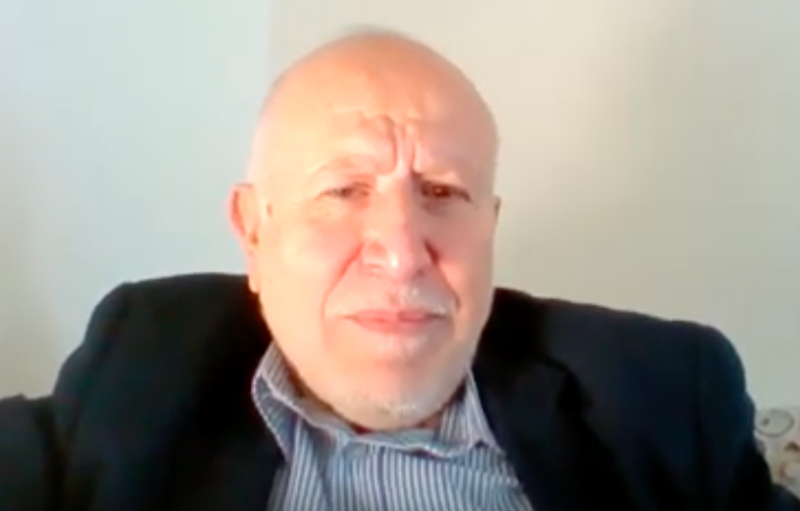
Hezbollah’s involvement in the war
Question: Since the beginning of the current conflict, Iran has denied its involvement in the offensive of Hamas. Additionally, we see scanty or even symbolic engagement of Hezbollah from the north. Having considered Hezbollah-Iran’e engagement in the war in 2006 against Israel and Hezbollah’s relatively successful fight compared to the previous Arap-Israeli wars, how come Hezbollah avoids taking full-scale action?
I am not a military expert, but first of all, don’t forget that the Israeli army is still occupying a part of Lebanese territory. Maybe people abroad forget that after the foundation in 1948, Israel expelled a lot of Palestinians to Lebanon. Now Lebanon has 400,000 Palestinian refugees. They have full right to return to their land.
Hezbollah and other fractions of Lebanese resistance didn’t deny that they endorse Hamas and other fractions of Palestinian resistance. Hezbollah has been doing its best to confront the Israeli army.
7th October was launched without the coordination of other resistance groups.
After Dr. Ahmad Malli, Prof. Bessam Abu Abdullah, political scientist from Syria made his presentation.
In our region, Syria, Lebanon, and Palestine, we are celebrating Christmas. We consider Christ to be ours. I want to congratulate your Christmas. To talk about Christmas is difficult because of what is going on in Gaza.
I want to present the Syrian view of the point. I think President Bashar Assad on 16th December talked clearly about Gaza during the meeting of the Central Committee of Baath Party. He mentioned various evidence and truths which we should talk about and in which we should believe. We should study lessons from what has been going on in Gaza since the 7th of October.
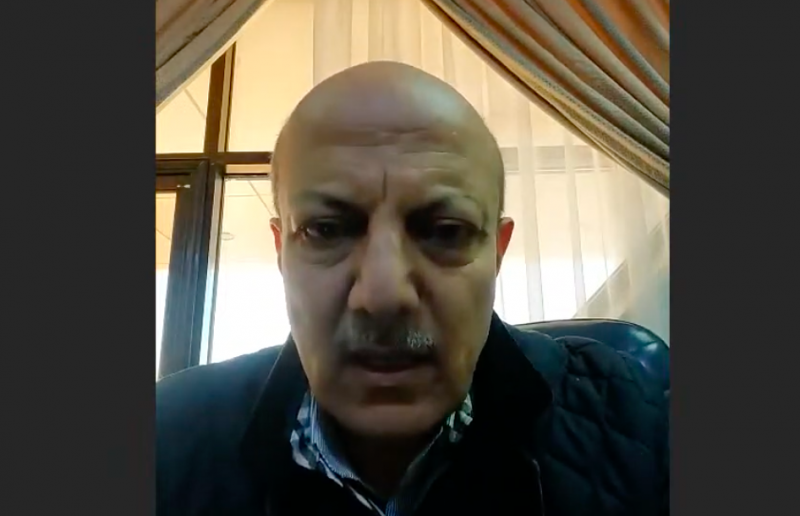
Israel is defeated
First of all, we should believe that the Israelis are already defeated in Gaza. It doesn’t matter how many civilians are killed and how much infrastructure is destroyed. The results are clear: What many considered the strongest army in the region is defeated in front of a group of resistance, Hamas and other resistance groups. This is the first lesson.
An artificial body in the region
The second is that Israel is nothing without American and Western support. Because it is not an original body in our region, it is artificial as a society and state. If we compare between the societies, of Palestinians and Israelis, we can see that fact. Israel is not rooted in Palestine and they are considering a place for investment to be an instrument in the hand of the West against the peoples in the region.
The third lesson is that the Palestinians could for the first time publish their narrative about what is going on in Palestine. The Zionist narrative is not believed anymore by many people in the West, especially in the US.
A moral comparison
The fourth lesson is about the moral comparison between the two sides, a comparison between how the Palestinian resistance dealt with the Israeli hostages and how Israel did with the Palestinian hostages. This is a very important victory for the story of Palestine.
The fifth lesson is that in the big issues like the Palestine issue, we cannot make an accurate evaluation only by looking at how many people die. Neither by calculating the destruction in the infrastructure. Absolutely it is not easy to say that and talk about the lives of the people, but we should analyse the Palestine issue in a professional way.
Israel is weaker than we expected
The sixth is that Israel is weaker than we expected. Israel has also problems in the domestic sphere, until now 1 million Israelis left Israel.
The seventh lesson is that for the US and Israel, there is no difference between Hamas, el Fetih and Palestinian people, they are attacking everywhere. And secondly, they are attacking Iraq, Syria and Lebanon both Christians and Muslims. We should take that into consideration and see there is no solution without a collective effort. Especially the Turkish government has double standards, while Turkish people support Palestine, the Turkish government is looking for its economic interest.
The eighth is that defending Gaza is to defend our own lands because the resistance in Gaza is defending every right we have in the region.
Nothing has changed in the West
The ninth lesson is about the attitude of the collective West. Nothing has changed in the West and they consider the region a colony. Their words on “democracy”, “human rights” and “freedom” is a big lie. Maybe the people in the West are different, but there is no change in the attitudes of the leader.
What can we do for Gaza?
Now what can we do for Gaza? Maybe our governments have their own interests, but parties, organizations and social forces can do a lot. Secondly, we should continue to inform people. For instance, we have the resolution of the General Assembly of the United Nations dated 10th November 1975 stating that Zionism is an “apartheid movement”. And lastly, we should support our brothers and sisters in Gaza in terms of basic needs like food and water. We should push for humanitarian aid. And we should work on the international level to create an international alliance against the collective West. We should not leave the Palestinian issue in the hands of Qatar or Egypt. Russia and China can also get involved in such a process.
After his presentation, Prof. Bessam Abu Abdullah also gave an answer to the question on Hezbollah’s involvement in the war:
Before discussing Hezbollah, we should discuss the situation of 57 Arab and Muslim states. Especially the attitude of Türkiye should change. Türkiye finally discovered that they are also among the targets of NATO. Turks and national forces in Türkiye should put pressure on the government and President Erdoğan.
The war against Syria was because of its support to resistance forces in Lebanon, Iraq and Palestine. In 2003 Colin Powell came to Syria and met with President Assad. He issued Syria stop support to resistance groups as a precondition to stop the war against Syria.
We should unite our forces. No separation between Sunni and Shii, or Arab, Persian, Turks of Kurds.
The Greater Kurdistan project: the second Israel
Question: The Greater Kurdistan project of the US and Israel covering the lands of Syria, Türkiye, Iraq and Iran is known to everyone. In fact, this puppet state is called the “Second Israel”. Wouldn’t the elimination of that structure in Syria have a positive impact on the Palestinian resistance?
I wrote many articles on this topic in Turkish newspaper. The TV of Mr. Barzani shows the map of the “Great Kurdistan” covering Syria, Iraq, Iran and Türkiye.
We should note that many Kurdish people also don’t accept such a plan. However Kurdish organizations are the puppet of the US.
Without coordination between these four countries, there is no possibility of confronting the plan of the US and Israel. The Turkish government made many mistakes in the past in this regard, but Ankara is now more aware of the fact that they are also the target of the US.
The last speaker of the webinar was Vyacheslav Matuzov, former Soviet and Russian Diplomat.
The US and Israel have a plan, where is ours?
What is going on in Gaza is a global issue. The US and Israel are acting according to their plan. Both politically and militarily. It is a very good planned action. To face this, it is necessary for us to be at the same level of responsibility. So I ask: Where is our plan? Where is the Arab plan?
Arab and Islamic world got together in Riyad and made a declaration stating the need to stop military action and Israeli aggression, but I think these are merely words. We cannot stop them only by words and declarations.
“A new big Middle East” for the US
Condoleezza Rice declared the American goal when she said “We will construct a new big Middle East”. So, the US and Israel are following the plan they proclaimed many years ago. They want an Israel territory from river to sea, from Lebanon to Sinai. This was also declared in Donald Trump’s era. What is happening in Gaza now is not an accident, but a part of their regional and global plan.
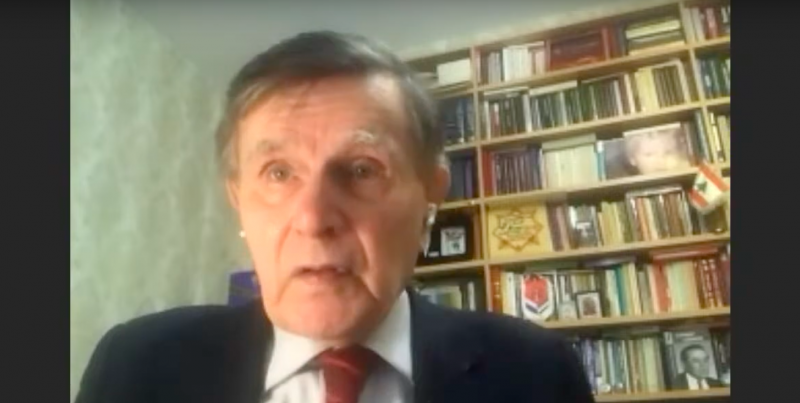
Who organized the October 7th? Iran? No. If Iran had done it, Lebanon and Hezbollah would have gotten involved in the war immediately. If it was decided only in Gaza, then it leads the situation more in favor of Israel.
“The deal of the century”
I am sure that the reason behind hundreds of thousands of ISIS militants were brought to Syria was to destroy Jordan and open are for the deal of the century as called by Trump and Netanyahu by pushing the Jordanians aside. When I met with Mahmud Abbas in Ramallah, I saw that he didn’t know anything about the deal of the century.
Where is the political unity of the Palestinians?
I think the Palestinian side has lost the main key to achieving the goals in the struggle against the US and Israel. They are split into two parts as Gaza Strip and the West Bank. Where is the political unity? Political unity was one of the most important weapons in the hands of the Palestinians. For 50 years it was the unity of command of the Palestinian people that brought them to the international level. In 1988 Russia recognized Palestinians and they had the status of full participation in the embassy.
To unite the Palestinian people under one command
Americans did everything not to let the Palestinians unite. Today military decisions are made by Hamas in Gaza, but the political center, representative of the Palestinians on the international level is located in the West Bank. I think the main task of today is to unite the Palestinian people under one command. Military decisions should be based on political plans and to fulfil political goals. I think we lost this connection between the two main parts of decision-making. Splitting Palestinian leadership was a weapon in the hands of the US and Israel.
Vyacheslav Matuzov also answered the question on the US’s “Greater Kurdistan project”.
American military analyst Rals Peters printed in the Atlantic Journal the “new borders” of the Middle East where parts of Türkiye, Syria, Iraq and Iran are allocated to establish a Kurdish state. Establishing a Kurdish state is the plan of the US. The declaration of Condoleezza Rice in 2006 was also covering that.







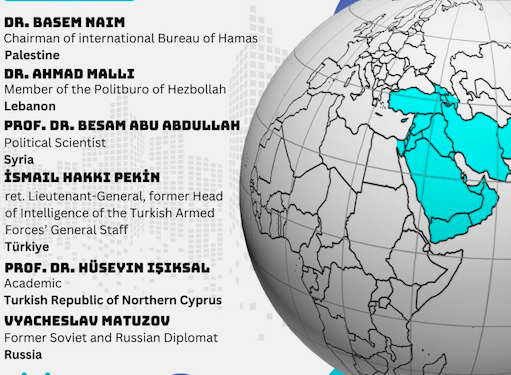









Leave a Reply